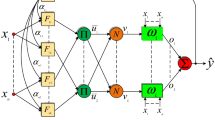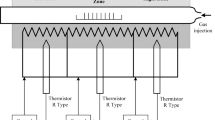Abstract
This paper presents a novel adaptive predictive proportional–integral–derivative (PID) control using fuzzy wavelet neural networks (FWNN) for a kind of highly nonlinear discrete-time system with time delay. The proposed controller, abbreviated as FWNN-APPID, is composed of an adaptive predictive PID controller with abilities of accurate tracking and disturbance rejection and an FWNN identifier with online parameter tuning and estimation. Several simulations for controlling a highly nonlinear time-delay process show constant disturbances rejection and its performance of setpoint tracking for the proposed FWNN-APPID control method, thus clearly showing its effectiveness and merit. Experimental results on a real PET stretch blow molding machine show the applicability of the proposed method.








Similar content being viewed by others
References
Garces, F., Becerra, V.M., Kambhampati, C., Warwick, K.: Strategies for Feedback Linearization—A Dynamic Neural Network Approach. Springer, New York (2003)
Spooner, J.T., Maggiore, M., Ordonez, R., Passino, K.M.: Stable Adaptive Control and Estimation for Nonlinear Systems: Neural and Fuzzy Approximation Techniques. Wiley, New York (2002)
Henson, M.A., Seborg, D.E.: Nonlinear Process Control. Prentice Hall, Upper Saddle River, NJ (1997)
Maciejowski, J.M.: Predictive Control with Constraints. Prentice Hall, Upper Saddle River, NJ (2002)
Soeterboek, R.: Predictive Control—A Unified Approach. Prentice Hall, Upper Saddle River, NJ (1992)
Vega, P., Prada, C., Aleixandre, V.: Self-tuning predictive PID controller. IEE Proc. D (Control Theory Appl.) 138(3), 303–311 (1991)
Yamamoto, T., Omatu, S., Haneda, M.: A design of self-tuning PID controllers. In: Proceedings of 1994 American Control Conference, Baltimore, Mayland, pp. 3263–3267 (1994)
Miller, R.M., Kwok, K.E., Shan, S.L., Wood, R.K.: Development of a stochastic predictive PID controller. In: Proceedings of 1995 American Control Conference, Seattle, Washington, pp. 4204–4208 (1995)
Tsai, C.C., Lu, C.H.: Multivariable self-tuning temperature control for plastic injection molding process. IEEE Trans. Ind. Appl. 34(2), 310–318 (1998)
Yusof, R., Omatu, S.: A multivariable self-tuning PID controllers. Int. J. Control 57(6), 1387–1403 (1993)
Yusof, R., Omatu, S., Khalid, M.: Self-tuning PID control: a multivariable derivation and application. Automatica 30(12), 1975–1981 (1994)
Omatu, S., Yusof, R., Sinohara, K., Hotta, M.: Temperature control for heating cylinder by multivariable STC. IEEE Trans. Syst. Control Inf. Eng. 5(3), 102–110 (1992). (in Japanese)
Yin, J.M., Shin, J.S., Lee, H.H.: On-line tuning PID parameters in an idling engine based on a modified BP neural network by particle swarm optimization. Artif. Life Robot. 14(2), 129–133 (2009)
Han, K.Y., Lee, H.H.: Neuro PID control of power generation using a low temperature gap. Artif. Life Robot. 16(2), 178–184 (2011)
Yu, D.L., Chang, T.K., Yu, D.W.: Fault tolerant control of multivariable processes using auto-tuning PID controller. IEEE Trans. Syst. Man Cybern. B Cybern. 35(1), 32–43 (2005)
Macku, L., Sámek, D.: Two step, PID and model predictive control using artificial neural network applied on semi-batch reactor. WSEAS Trans. Syst. 9(10), 1039–1049 (2010)
Khan, M.A.S.K., Rahman, M.A.: Implementation of a wavelet-based MRPID controller for benchmark thermal system. IEEE Trans. Ind. Electron. 57(12), 4160–4169 (2010)
Wang, M.L., Paulson, Joel A., Yan, H.C., Shi, H.B.: An adaptive model predictive control strategy for nonlinear distributed parameter systems using the type-2 Takagi-Sugeno Model. Int. J. Fuzzy Syst. 18(5), 792–805 (2016)
Boldbaatar, E.-A., Lin, C.M.: Self-learning fuzzy sliding-mode control for a water bath temperature control system. Int. J. Fuzzy Syst. 17(1), 31–38 (2015)
Abiyev, R.H., Kaynak, O.: Fuzzy wavelet neural networks for identification and control of dynamic plants—a novel structure and a comparative study. IEEE Trans. Ind. Electron. 55(8), 3133–3140 (2008)
Lu, C.H.: Wavelet fuzzy neural networks for identification and predictive control of dynamic systems. IEEE Trans. Ind. Electron. 58(7), 3046–3058 (2011)
Tsai, C.C., Wu, H.L., Tai, F.C., Chen, Y.S.: Distributed consensus formation control with collision and obstacle avoidance for uncertain networked omnidirectional multi-robot systems using fuzzy wavelet neural networks. J. Fuzzy Syst, Int (2016). doi:10.1007/s40815-016-0239-0. (in press)
Rudin, W.: Principles of Mathematical Analysis. McGraw-Hill, New York (1976)
Tsai, C.C., Chang, Y.L.: Self-tuning PID control using recurrent wavelet neural networks. In: 2012 IEEE International Conference on Systems, Man, and Cybernetics (SMC2012), pp. 3105–3110, Seoul, Korea (2012)
Tsai, C.C., Chang, Y.L.: Two degree-of-freedom control using recurrent fuzzy neural networks for a class of nonlinear discrete-time time-delay systems. In: Proceedings of 2012 International Conference on System Science and Engineering (ICSSE2012), Dalian, China (2012)
Tsai, C.C., Chang, Y.L., Tung, S.L.: Two DOF temperature control using RBFNN for stretch PET blow molding machines. In: Proceedings of the 2014 IEEE International Conference on Systems, Man, and Cybernetics (SMC), San Diego, CA, USA (2014)
Chang, Y.L., Tsai, C.C.: Self-tuning PID control using wavelet fuzzy neural networks. In: Proceedings of 2012 International Conference on Fuzzy Theory and Its Applications (iFuzzy2012), Taichung, Taiwan (2012)
Chang, Y.L., Tsai, C.C.: Adaptive predictive PID control using recurrent wavelet neural networks for a class of nonlinear discrete-time time-delay systems. In: Proceedings of 2016 International Conference on Advanced Robotics and Intelligent Systems (ARIS2016), Taipei, Taiwan (2016)
Chang, Y.L., Tsai, C.C.: Adaptive stable generalized predictive control using TSK fuzzy model for nonlinear discrete-time systems with time-delays. Int. J. Fuzzy Syst. (IJFS) 15(2), 133–141 (2013)
Tsai, C.T., Tsai, C.C.: Digital PID and feedforward temperature control for PET stretch blow molding machines. In: Proceedings of 2016 International Conference on Advanced Robotics and Intelligent Systems (ARIS2016), Taipei, Taiwan (2016)
Acknowledgements
The authors gratefully acknowledge financial support from the Ministry of Science and Technology (MOST), the Republic of China, under contract MOST 104-2221-E-005-054-MY2.
Author information
Authors and Affiliations
Corresponding author
Rights and permissions
About this article
Cite this article
Tsai, CC., Tai, FC., Chang, YL. et al. Adaptive Predictive PID Control Using Fuzzy Wavelet Neural Networks for Nonlinear Discrete-Time Time-Delay Systems. Int. J. Fuzzy Syst. 19, 1718–1730 (2017). https://doi.org/10.1007/s40815-017-0405-z
Received:
Revised:
Accepted:
Published:
Issue Date:
DOI: https://doi.org/10.1007/s40815-017-0405-z




